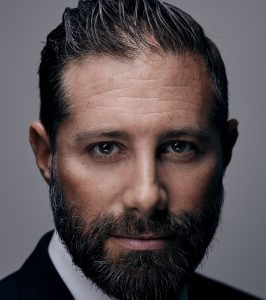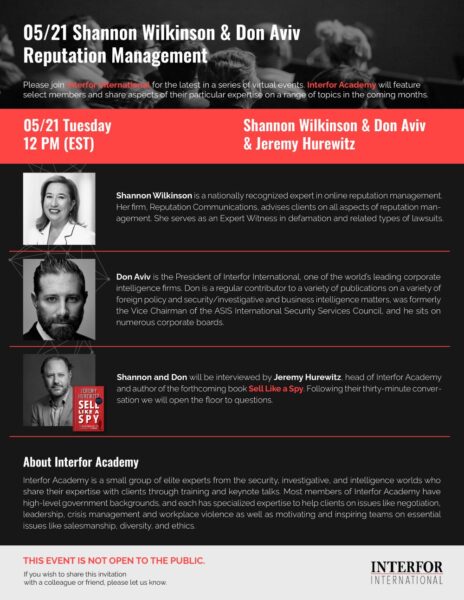
Recently Don Aviv, President of Interfor International and a Reputation Communications Advisory Board member, and Shannon Wilkinson, our founder and CEO, were interviewed on the topic of reputation management for an Interfor Academy webinar. Their moderator was Jeremy Hurewitz, Head of Interfor Academy.

Interfor Academy is a speaker’s bureau that enables organizations to book elite presenters for conferences, corporate off-sites, or risk trainings & tabletop sessions.
Don and Shannon come from two different sides of reputation management. He is on the investigative, data research, analytics, and monitoring side, helping organizations listen to conversations about them online and red flagging any that have reputational, privacy, or security risk aspects. (We interviewed him on the topic of due diligence in 2018; and more recently published his article, Scrubbing Your Personal Info from the Internet.) Reputation Communications, manages, amplifies and repairs reputations.
We are interviewing him about due diligence investigations, self-checks (or reverse due diligence), and how the deep dark web plays a role in threatening reputations.
Recently, The New York Times published a lurid expose about Robert F. Kennedy’s Presidential running mate. Do you think due diligence research was undertaken and dismissed? Or not done?
I would be surprised if Kennedy’s campaign was not aware of the allegations connected to his running mate, as many of them have been openly discussed for some time.
We do know that both major political parties haven’t been systematic when it comes to due diligence on opposition candidates. Jeremy and I wrote about exactly that in a piece for The Hill last year. But it will be interesting to see if there is more of this type of reporting. I think it will be tied directly to how he is polling and what type of impact he might have on the election.
How common is it now for deep dives to be done before important hires and partnerships are made?
It is increasingly common. That’s the good news for those of us who campaign constantly for companies to pay attention to reputational and security risk. The difference is in the level of diligence done and making a smart decision about that and what role the individual will play in any sort of company or partnership that is being established.
There is a fast-growing array of technological tools that can help employers get comfortable with low to mid-level hires. That sort of background check is cheap and somewhat effective. These are commoditized services that can give an employer a little reassurance that their prospective employee doesn’t have a criminal record, hasn’t declared bankruptcy, and did indeed graduate from the educational institution they are claiming on their resume.
But when it comes to more senior hires, or major investments being made and partnerships established, it is critical to go much deeper and try to understand the individual’s background and character at a more granular level, and drill down on any red flags to weigh those against whatever that person might contribute to what you’re building. So, in these cases, the more commoditized checks are insufficient.
Those who retain Interfor do so because our analysts have extensive experience in locating and evaluating deep dive public records and providing insight into what they find. True expertise comes into play when it comes to the very human side of collecting qualitative intelligence on a subject.
You used the term reputational “self-checks” during the webinar. What do you mean by that?
We are frequently hired by clients who want to know what their reputational assessment looks like and what might be used against them by someone looking to do them harm – physically or reputationally.
Your firm conducts social media threat monitoring for major corporations as well as for high-net-worth clients. How does that work, and what are they looking for?
While we certainly support HNW clients and celebrities around the world, we also support a large group of executives, nonprofits, foundations and start-ups. That client base includes any entity or individual that receives negative or unwanted attention through social media, chatgroups, blogs, and other online chatter. We have a global team of highly trained analysts who monitor threats 24/7 for a variety of companies and individuals across all common languages. They are deeply knowledgeable in assessing when someone might turn from an online troll to a true threat. They help identify new threat trends and help clients be proactive in preparing for any incipient risk.
How is AI going to impact what information appears on the internet about people and organizations?
AI will certainly be a force of change. We have seen a remarkable uptick in fraudulent activity ranging from Deepfakes and impersonations, all the way to confidence scams and straight-up harassment and trolling driven purely through AI systems.
For example, one of our clients, a well-known radio personality, has been inundated with thousands of fake product endorsements and ads geared at defrauding his listener base around the world. Our Social Media Threat Monitoring Team identifies and works to knock down approximately 50 fake ads and websites a week, yet this is likely a drop in the bucket.
Ultimately, without strong regulations, AI systems may add considerable fuel to the “fake news” ecosystem, and your average internet user will have even more trouble discerning fact from fiction.
*
As President of Interfor International, Don Aviv directly supports Chief Security Officers and General Counsel of some of the leading corporations, financial institutions and family offices around the world.
An author on physical security, threat mitigation and corporate security matters, he serves as an expert witness on security-related legal matters. His credentials include Board Certified Protection Professional (CPP); Board Certified Physical Security Professional (PSP); Professional Certified Investigator (PCI) and licensed New York State Investigator. He is an executive board member of Strength-to-Strength, a non-profit organization dedicated to supporting victims of terrorism. Mr. Aviv is also a board member of The Community Security Service, a non-profit organization dedicated to training and protecting local communities.
*
This article is part of our continuing Interview with an Expert series.




